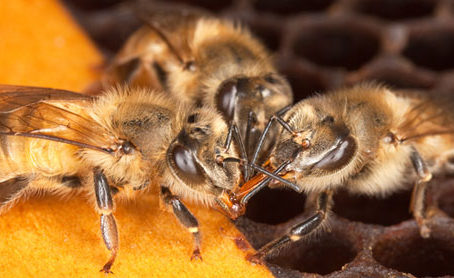Aug 25, 2016Traveling bees have shorter lives, more stress
Research from North Carolina State University, published in Scientific Reports, shows that travel can adversely affect bee health and lifespans.
Honey bees (Apis mellifera) are frequently trucked around the United States to pollinate crops like apples, almonds and berries. The new research shows that traveling bees generally have shorter lives than stationary bees, and they also have greater oxidative stress levels, which ages them more quickly and may lessen their capacity to fight off disease and parasites.
In one experiment, bees from commercial colonies that had traveled to pollinate almonds in California and then in Maine were compared to bees from colonies that remained stationary in the NC State apiary. Bees from traveling colony bees lived about one day less than the stationary bees.
“One day may seem trivial, but when a normal forager bee lifespan is only around 20 days, one day is significant,” said Michael Simone-Finstrom, one of the co-authors.
In another experiment, researchers compared lifespan and colony health of migratory bees that traveled relatively short distances in North Carolina – 35 to 60 miles in a handful of trips – to stationary bees; both types of colonies were controlled by the researchers.
“We saw the same lifespan differences as in the first experiment, plus we saw more oxidative stress in traveling bees when compared to stationary bees,” said co-author Hongmei Li-Byarlay.
However, this increase in stress levels was only apparent early in the season – May and June – when the stationary bees had plenty of access to food. As the flowers dried up in the North Carolina summer heat, stationary bees had to work harder to find food, while the traveling bees were moved into fields of blooming plants and therefore did better.
In the third experiment, researchers compared oxidative stress levels of stationary bees with bees that were transported across North Carolina for three hours each day for six consecutive days – a more intensive bee travel regimen than the second experiment. The results shed light on how the bee-rearing environment – where bees were raised as larvae – can impact the oxidative stress levels when bees become adults. In this experiment, foraging bees raised in migratory bee colonies had higher oxidative stress levels than foraging bees raised in stationary hives.
Li-Byarlay says she’d like to look at longer-term effects of bee migration and the interaction with nutrition, as this study examined bees over the course of roughly four months in late spring and summer. As honey bee colonies nationwide currently experience higher annual mortality, understanding effects through overwintering and mitigation of these effects would be particularly insightful.
Source: The Entomology Society of America

















